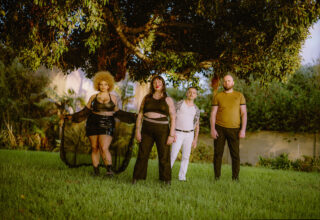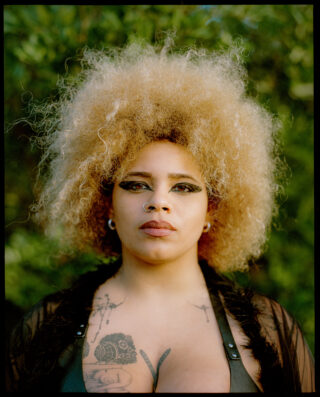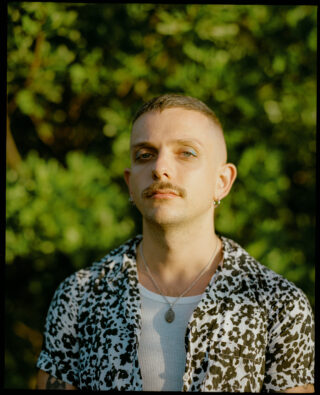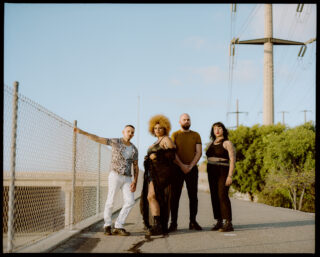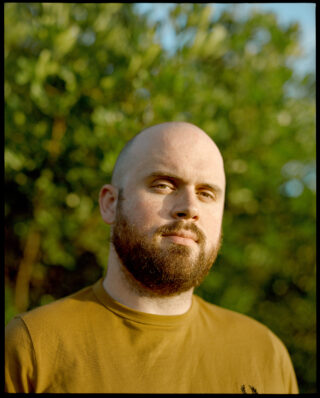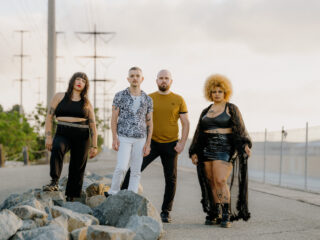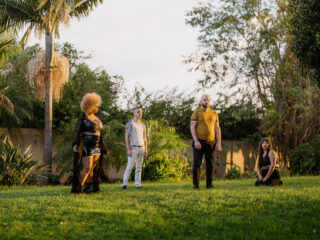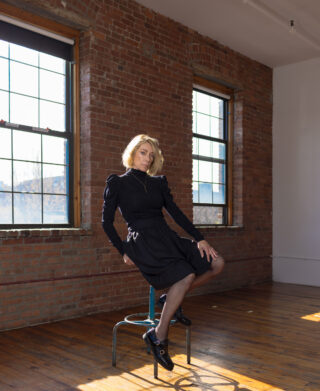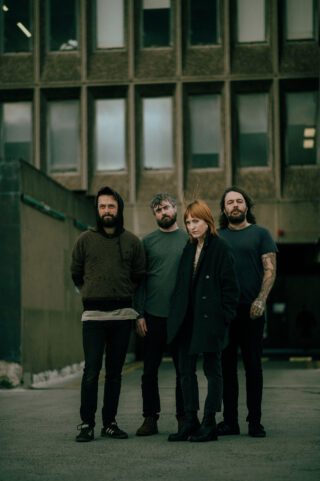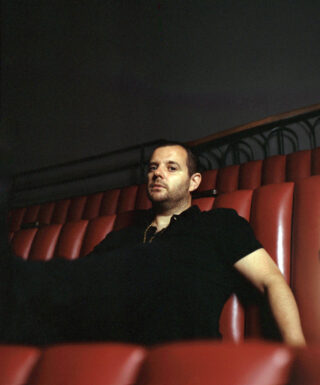The sheer scale and atmosphere of Los Angeles is disorientating, particularly for a first-time visitor, particularly one from the UK. This city has been romanticised to death by proud locals and misty-eyed dilettantes, so there’s little point in providing yet more material for the Californian tourist board here, but the grandiose, over-familiar reputation of the place is not completely unfounded. The thick, syrupy light; the arcing palms cascading over the endless streams of traffic; the flowing contours of the San Gabriel foothills, gradually cresting up into the watercolour traces of the mountains beyond. It’s a strange, liquid place: fluid, serene, unknowable, with danger somewhere below the surface. At least that’s how it seems to someone more used to the anxious density of European cities, thrown together by necessity over the course of centuries, a far more improvisational, precarious urbanism, smaller in breadth but no less intense.
It’s the night before our conversation in the Thai restaurant, and Special Interest are playing at The Echo on the western end of Sunset Boulevard. It’s a no-frills venue in a neatly fashionable part of town; the lush Echo Park is nearby, with the patchwork neighbourhoods of Silver Lake eventually morphing into East Hollywood a couple of miles in the other direction. Yet its back-to-basics appeal is undercut somewhat by the airport-style security I have to go through on the way in. As I put everything back in my pockets having been thoroughly scanned and patted down, the band’s US publicist, Melanie, and her LA lifer friends bring me up to speed with the inevitable story of gentrification and paranoia that precipitated the venue’s recent scaling up of security. A little while ago, it was bought out by a multinational corporate promoter. In came a stripping-back and reorganisation of the interior (my companions seem a little dismayed that the room they remember from so many happy nights out has been altered so clinically), an intimidating surveillance system and, as we’re about to find out, price hikes behind the bar.
It’s not that it’s an unpleasant or ill-fitting venue – it does the job perfectly well. But its story is indicative of the same cycles of gentrification, displacement and dislocation that are just as familiar in the UK as the US. Those cycles haunt LA as they have done for decades, its international cultural prestige constantly in the process of ripening for co-option and commodification, with any inconvenient contradictions or obstacles – any inconvenient people or communities – cast aside like old peel. Earlier that day I’d wandered around the city for a few hours, a typical outsider who doesn’t realise that that’s not really the done thing here, and witnessed for myself the way in which the desperate poverty of this place is in a continuous dialectic with its fabulous wealth, the mini-metropolises of tents and squats cowering in the shadows of its celebrity mansions and dynastic film studios. Of course, that’s the nature of capital accumulation – mass deprivation doesn’t proliferate in spite of the flourishing of private luxury, but because of it. And I live in London – I’m used to seeing privilege and squalor coexisting, the elevation of the former constantly prioritised at the expense of the alleviation of the latter; but like everything in LA, it’s just bigger and more visible here. It’d be crass to suggest something along the lines of the fate of DIY music venues being the thin end of the wedge – these issues are deeper, older, international in scope – but it’s telling that even in this bohemian, not-yet-entirely gentrified corner of the city, tonight playing generous host to an emancipatory punk band, the processes of dispossession which form and reform the character of so much contemporary urban life are clearly, inescapably visible.
Of course, Special Interest are more than aware of this stuff. Our conversations during my time with them are peppered with mentions of their involvement in community organising, grassroots culture and industrial action; at one point, they lament the lack of tenants’ rights in the States, and the impact this has on working class communities. And it’s written into their lyrics, from ‘Foul’s call-and-response workplace angst (“Dirty money, dirty boss… I’ll save up for vacay smoke break!”) via the disintegration of ‘Concerning Peace’ (“Who gets offered the American dream to OD on fent in a fascist regime?”) to ‘Midnight Legend’s ode to the fleeting instances of liberation which occasionally make all this shit feel tolerable (“Won’t you tell me all about your story, and about the day that you didn’t have to fight? I’m just here to listen, sound board for your visions, all you need to say, you say with your eyes”). This is a band painfully attuned to the reality of life in modern America, with all the violence, injustice and all-too-infrequent joy that that implies.
Anyway, back to the show. Inside The Echo, queer kids in bondage gear and older crusties in ancient denim rub shoulders, a nice reflection of the band’s multi-subcultural appeal. Yet even among these eclectic groups, not to mention the countless annoyingly attractive, well-dressed Angelenos wandering the street outside, Special Interest stand out immediately. They’re a remarkably varied yet cohesive-looking group of people: Alli in red jumpsuit and vampy Julia Fox makeup under their gold-tinted Afro; Ruth in tight T-shirt and waistcoat, a bright pop of eyeshadow complementing his neckerchief; Nathan the erstwhile DIY scene stalwart, bearded, dressed stylishly but pragmatically; Maria with Horses-era Patti Smith fringe and shoulderless top, casual but focused.
They file onstage one-by-one, Ruth’s pneumatic drum machine heralding the show as Alli emerges last, just in time to reach the mic for the opening lines of ‘Cherry Blue Intention’. Their lips curl into a snarl as they spit the track’s insistent vocal part, the crowd collapsing into a feverish, gyrating mass before them. It’s an entrance.
The set barrels forwards from there, alternating between the jaw-clenching noise-punk of Special Interest’s early releases and the sleeker art-rock of Endure. ‘(Herman’s) House’ becomes a bona-fide anthem in a space like this, bolstered by a meaty soundsystem; the gang vocals of ‘Foul’ bounce around the room like Shopping playing Berghain; ‘Street Pulse Beat’ transcends its recorded atmosphere of Blue Nile-meets-Helena Hauff turbine hall melodrama and becomes something even more cathartic. Alli glowers over the audience imperiously, fully aware of their power. It’s tempting to say Special Interest are like a well-oiled machine live, but quite apart from how clichéd that is, it also fails to capture the specificity of the experience. If this band is a machine, it’s a snowplough, heavy but economical, a purpose-built device to cut through the encroaching cold, carving out a wide path for Alli to dance along and across at their own pace, following a general route without being restrained by their bandmates’ precise line of flight.
When I say hi after the set, meeting the band for the first time, they’re still catching their breath. Nathan, shy but assured, has made a beeline for his shift on the merch table; Alli lets out a quick hello before dashing off to meet some old friends on the other side of the room; Ruth is giggly and self-effacing; Maria welcoming and keen to catch up with the label people who’ve accompanied me to the gig. After a while, we head to a barely-lit bar across the road, where some friends of the band are performing as part of a drag show. Everyone unwinds, jetlag and alcohol definitely making me even more charming and not even more awkward and weird, and the night meanders to a close a few hours later.




